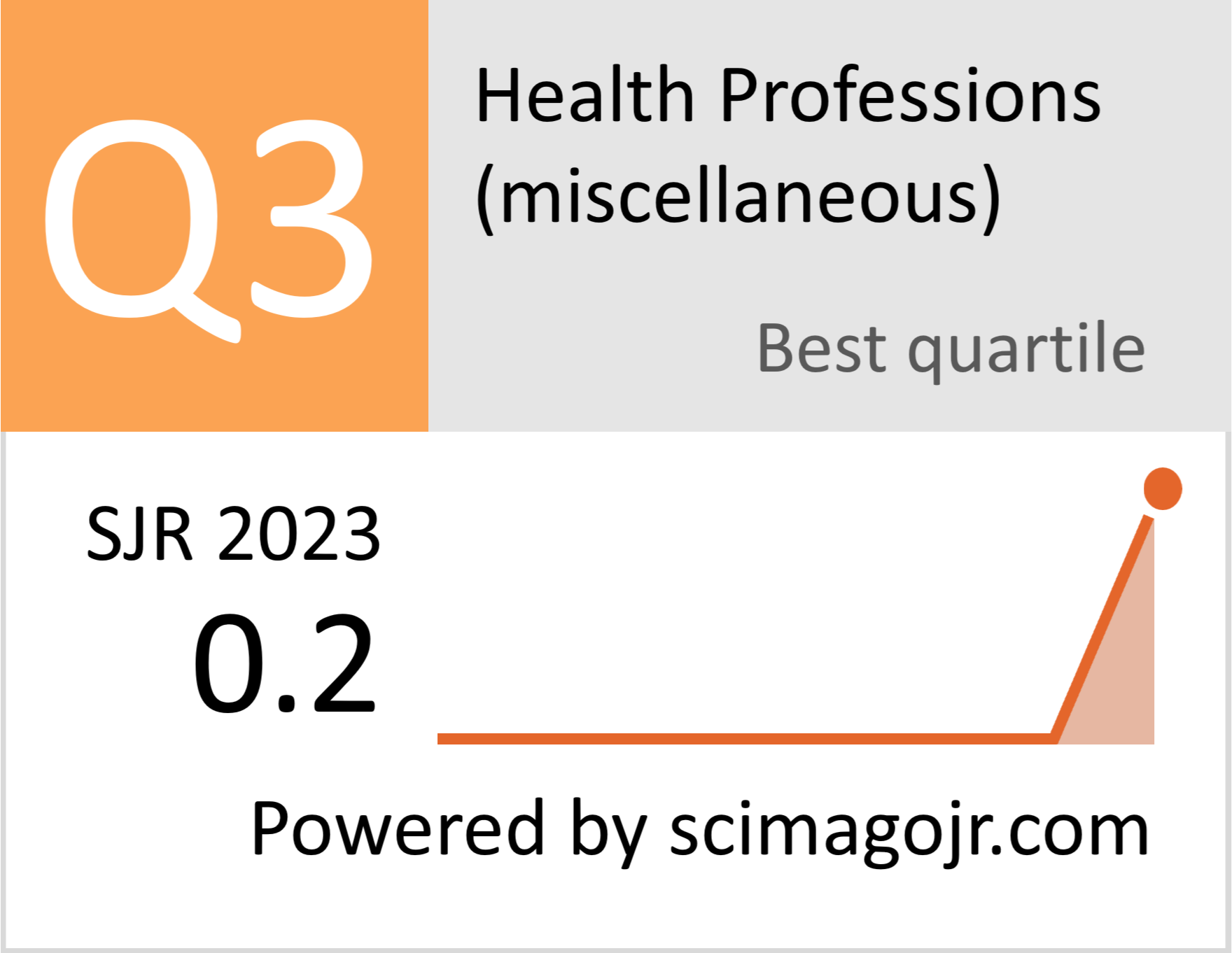Cariogenic Risk in the Presence of Foods with Varied Glycemic Index in Dentistry Students. Cross-Sectional Study
Riesgo cariogénico en presencia de alimentos de variado índice glicémico en estudiantes de odontología. Estudio transversal

This work is licensed under a Creative Commons Attribution-NonCommercial-NoDerivatives 4.0 International License.
Show authors biography
Introduction. Dentistry, a profession with high levels of stress, is associated with a decrease in quality of life and possible risks to oral health.
Objective. Identify the cariogenic risk from foods consumed by dentistry students in the Biobío region.
Methodology. Cross-sectional descriptive study with 178 dental students from the Biobio region (Chile), whose analysis considers the self-assessment of academic stress with the Academic Stress Inventory, cariogenic risk through the Lipari and Andrade Cariogenic Food Consumption Survey, and the glycemic index evaluated by the International Glycemic Index Tables. The statistical analysis considers the Chi-square test, with the effect size determined by Cramer's V.
Results. The students were 22.2 ± 3.1 years old. The prevalence of overweight or obesity was 44.4% (n = 79), 52.8% (n = 94) were of normal weight, and 2.8% (n = 5) were underweight. Additionally, 59.6% (n = 106) reported low stress levels and 57.8% (n = 103) had medium cariogenic risk. The analysis of cariogenic risk revealed significant differences in the intake of 14 food groups, especially those high in sugars. In the overweight/obesity subgroup, significant differences were observed in the consumption of milk, cookies, soda crackers, candies, and sweet pastries.
Conclusion. An association was found between foods rich in sugar, nutritional status, and cariogenic risk, while appetizing foods were related to academic stress.
Article visits 796 | PDF visits 279
- Kogoj TK, Cebašek-Travnik Z, Zaletel-Kragelj L. Role of stress in burnout among students of medicine and dentistry - a study in Ljubljana, Slovenia, Faculty of Medicine. Coll Antropol [Internet]. 2014;38(3):879-87. Available from: https://www.collantropol.hr/antropo/article/viewFile/290/832
- Visoso Salgado A, Sánchez Reyna PA, Montiel Bastida NM. Burnout Syndrome in the Faculty of Dentistry, Universidad Autónoma del Estado de Mexico: a Comparative Study. Int J Odontostomat [Internet]. 2012;6(2):129-38. doi: https://doi.org/10.4067/S0718-381X2012000200003
- Atkinson FS, Foster-Powell K, Brand-Miller JC. International tables of glycemic index and glycemic load values: 2008. Diabetes Care [Internet]. 2008;31(12):2281-3. doi: https://doi.org/10.2337/dc08-1239
- Atkinson FS, Brand-Miller JC, Foster-Powell K, Buyken AE, Goletzke J. International tables of glycemic index and glycemic load values 2021: a systematic review. Am J Clin Nutr [Internet]. 2021;114(5):1625-32. doi: https://doi.org/10.1093/ajcn/nqab233
- Rodríguez I, Fonseca GM, Aramburú G. Academic Stress of Freshmen Students at the Faculty of Dentistry Universidad Nacional de Cordoba, Argentina. Int J Odontostomat [Internet]. 2020;14(4):639-47. doi: https://doi.org/10.4067/S0718-381X2020000400639
- Luna D, García-Reyes S, Soria-González EA, Avila-Rojas M, Ramírez-Molina V, García-Hernández B, et al. Academic Stress in Dental Students: Association with Social Support, Positive Thinking and Psychological Well-Being. Inv Ed Med [Internet]. 2020;9(35):8-17. doi: https://doi.org/10.22201/facmed.20075057e.2020.35.20205
- Rodríguez F, Palma X, Romo A, Escobar D, Aragú B, Espinoza L, et al. [Eating habits, physical activity and socioeconomic level in university students of Chile]. Nutr Hosp [Internet]. 2013;28(2):447-55. doi: https://doi.org/10.3305/nh.2013.28.2.6230
- Uchida-Fukuhara Y, Ekuni D, Islam MM, Kataoka K, Taniguchi-Tabata A, Fukuhara D, et al. Caries Increment and Salivary Microbiome during University Life: A Prospective Cohort Study. Int J Environ Res Public Health [Internet]. 2020;17(10):1-12. doi: https://doi.org/10.3390/ijerph17103713
- Núñez, DP, García Bacallao L. Biochemistry of dental caries. Rev haban cienc méd [Internet]. 2010; 9(2):156-66. Available from: http://scielo.sld.cu/scielo.php?script=sci_arttext&pid=S1729-519X2010000200004
- Siraj ES, Pushpanjali K, Manoranjitha BS. Efficacy of stevioside sweetener on pH of plaque among young adults. Dent Res J [Internet]. 2019;16(2):104-9. Available from: https://www.ncbi.nlm.nih.gov/pmc/articles/PMC6364349/
- Barembaum SR, Azcurra AI. Saliva: a potential tool in Dentistry. Rev Fac Odont [Internet]. 2019;29(2):8-21. doi: https://doi.org/10.25014/revfacodont271.2019.2.9
- Manuzza MA, Brito G, Echegaray NS, López LB. Glycemic index and glycemic load: their value in treatment and prevention of noncommunicable chronic diseases. Diaeta [Internet]. 2018;36(162):29-38. Available from: http://www.scielo.org.ar/scielo.php?script=sci_abstract&pid=S1852-73372018000100005
- Morales Cruz A, Tiburcio-Morteo L, Capetillo-Hernández GR, Herrera-Astorga MA, Palmeros-Exsome C, Barranca-Enríquez A. Common habits that affect oral health in university students, Veracruz. Rev Mex Med Forense [Internet]. 2020;5(Suppl 4):62-5. Available from: https://www.medigraphic.com/cgi-bin/new/resumenI.cgi?IDARTICULO=100378
- Peker I, Akarslan Z, Basman A, Haciosmanoglu N. Knowledge and behavior of dentists in a dental school regarding toothbrush disinfection. Braz oral res [Internet]. 2015;29(1):1-8. doi: https://doi.org/10.1590/1807-3107BOR-2015.vol29.0048
- Sales GC, Marques MG, Rubin DR, Nardoni DN, Leal SC, Hilgert LA, et al. Are Brazilian dentists and dental students using the ICCC recommendations for caries management? Braz oral res [Internet]. 2020;34:1-10. doi: https://doi.org/10.1590/1807-3107bor-2020.vol34.0062
- Srivastava R, Atri M, Pareek S, Chadha M, Sharma A. Poor Dietary Habits: A Function of Online Food Delivery Fad among Medical and Dental College Students in India. J Lifestyle Med [Internet]. 2021;11(2):74-81. doi: https://doi.org/10.15280/jlm.2021.11.2.74
- Marshall TA, Laurence B, Qian F, Robinson-Warner G, Handoo N, Anderson C. Food insecurity is associated with lower diet quality among dental students. J Dent Educ [Internet]. 2023;87(11):1574-84. doi: https://doi.org/10.1002/jdd.13344
- Sushma R, Vanamala N, Nagabhushana D, Maurya M, Sunitha S, Reddy C. Food Choice Motives among the Students of a Dental Institution in Mysore City, India. Ann Med Health Sci Res [Internet]. 2014;4(5):802-5. Available from: https://www.ncbi.nlm.nih.gov/pmc/articles/PMC4199178/
- Jouhar R, Ahmed MA, Khurshid Z, Bokhari SAH. Association of BMI, Diet, Physical Activity, and Oral Hygiene Practices with DMFT Index of Male Dental Students at King Faisal University, Al-Ahsa. Nutrients [Internet]. 2021;13(1):1-15. doi: https://doi.org/10.3390/nu13010224
- Chifor I, Badea I, Chifor R, Popa D, Staniste L, Tarmure D, Avram R. Saliva characteristics, diet and carioreceptivity in dental students. Clujul Med [Internet]. 2014;87(1):34-9. Available from: https://www.ncbi.nlm.nih.gov/pmc/articles/PMC4462414/
- Manikandan S, Ramesh M, Yoithapprabhunath TR, Kandasamy K, Ponnusamy P, Vishnuvarthan A. A Cross-Sectional Study to Find the Correlation between the Level of Fluoride in Drinking Water, Dental Fluorosis and Associated Risk Factors- A Original Research. J Pharm Bioallied Sci [Internet]. 2023;15(Suppl 1):S651-S655. doi: https://doi.org/10.4103/jpbs.jpbs_24_23
- Ekuni D, Toyama N, Iwasaki Y, Morita M. New Method of Avoiding Underestimation of Caries Incidence and Its Association with Possible Risk Factors in Japanese University Students: A Prospective Cohort Study. Int J Environ Res Public Health [Internet]. 2022;19(4):1-12. doi: https://doi.org/10.3390/ijerph19042490
- Shaiban AS. Perceived stress among staff in Saudi Arabian dental colleges before and after an accreditation process: A cross-sectional study. World J Clin Cases [Internet]. 2024;12(4):758-65. doi: https://doi.org/10.12998/wjcc.v12.i4.758
- Autio-Gold JT, Tomar SL. Dental students’ opinions and knowledge about caries management and prevention. J Dent Educ [Internet]. 2008;72(1):26-32. doi: https://doi.org/10.1002/j.0022-0337.2008.72.1.tb04449.x
- Cuschieri S. The STROBE guidelines. Saudi J Anaesth [Internet]. 2019;13(Suppl 1): S31-S34. doi: https://doi.org/10.4103/sja.SJA_543_18
- World Medical Association. World Medical Association Declaration of Helsinki: ethical principles for medical research involving human subjects. JAMA [Internet]. 2013;310(20):2191-94. doi: https://doi.org/10.1001/jama.2013.281053
- García-García MR, Villarreal-Ríos E, Galicia-Rodríguez L, Martínez-González L, Vargas-Daza EM, García-Kuri LA. [Risk factors and the probability of developing dental decay in four-year-old children]. Rev Med Inst Mex Seguro Soc [Internet]. 2011;49(1):9-12. Available from: https://www.redalyc.org/articulo.oa?id=457745500004
- Pozos-Radillo BE, Preciado-Serrano ML, Plascencia-Campos AR, Aguilera Velasco MA, Acosta Fernández M. Trait-state anxiety, academic stress and coping styles in nursing university students in Mexico. Index Enferm [Internet]. 2021;30(1-2):134-8. Available from: https://ciberindex.com/index.php/ie/article/view/e12852
- Cohen JFW, Hecht AA, McLoughlin GM, Turner L, Schwartz MB. Universal School Meals and Associations with Student Participation, Attendance, Academic Performance, Diet Quality, Food Security, and Body Mass Index: A Systematic Review. Nutrients [Internet]. 2021;13(3):1-41. doi: https://doi.org/10.3390/nu13030911
- Durán S, Crovetto M, Espinoza V, Mena F, Oñate G, Fernández M, et al. Lifestyles, body mass index and sleep patterns among university students. Rev méd Chile [Internet]. 2017;145(11):1403-11. doi: http://dx.doi.org/10.4067/s0034-98872017001101403
- Smith L, Grabovac I, Jackson SE, Veronese N, Shang C, López-Sánchez GF, et al. Chocolate Consumption and Indicators of Adiposity in US Adults. Am J Med [Internet]. 2020;133(9):1082-7. doi: https://doi.org/10.1016/j.amjmed.2020.01.020
- Rodríguez-Rodríguez F, Cristi-Montero C, Villa-González E, Solís-Urra P, Chillón P. Comparison of the physical activity levels during the university life. Rev méd Chile [Internet]. 2018;146(4):442-50. doi: https://doi.org/10.4067/s0034-98872018000400442
- Javed K, Nasir MZ, Jalees M, Manzoor MA. Role of diet and dietary habits in causing dental caries among adults reporting to a tertiary care hospital in Pakistan; a case-control study. Heliyon [Internet]. 2023;9(12):e23117. doi: https://doi.org/10.1016/j.heliyon.2023.e23117
- Tappy L, Lê KA. Metabolic effects of fructose and the worldwide increase in obesity. Physiol Rev [Internet]. 2010;90(1):23-46. doi: https://doi.org/10.1152/physrev.00019.2009
- Lin Y, Chen J, Zhou X, Li Y. Inhibition of Streptococcus mutans biofilm formation by strategies targeting the metabolism of exopolysaccharides. Crit Rev Microbiol. [Internet]. 2021;47(5):667-77. doi: https://doi.org/10.1080/1040841X.2021.1915959
- Correa T, Fierro C, Reyes M, Taillie LS, Carpentier FRD, Corvalán C. Why Don't You [Government] Help Us Make Healthier Foods More Affordable Instead of Bombarding Us with Labels? Maternal Knowledge, Perceptions, and Practices after Full Implementation of the Chilean Food Labelling Law. Int J Environ Res Public Health [Internet]. 2022;19(8):1-11. doi: https://doi.org/10.3390/ijerph19084547
- Errisuriz VL, Pasch KE, Perry CL. Perceived stress and dietary choices: The moderating role of stress management. Eat Behav [Internet]. 2016;22:211-6. doi: https://doi.org/10.1016/j.eatbeh.2016.06.008
- Martínez P, Jiménez-Molina A, Mac-Ginty S, Martínez V, Rojas G. Mental Health of Higher Education Students in Chile: Scoping Review and Meta-Analysis. Ter psicol [Internet]. 2021;39(3):405-26. doi: https://doi.org/10.4067/S0718-48082021000300405
- Landaeta-Díaz L, González-Medina G, Agüero SD. Anxiety, anhedonia and food consumption during the COVID-19 quarantine in Chile. Appetite [Internet]. 2021;(164):105259. doi: https://doi.org/10.1016/j.appet.2021.105259
- Sheiham A. Sucrose and dental caries. Nutr Health [Internet]. 1987;5(1-2):25-9. doi: https://doi.org/10.1177/026010608700500205
- Moynihan P. Sugars and Dental Caries: Evidence for Setting a Recommended Threshold for Intake. Adv Nutr [Internet]. 2016;7(1):149-56. doi: https://doi.org/10.3945/an.115.009365
- Martignon S, Roncalli AG, Alvarez E, Aránguiz V, Feldens CA, Buzalaf MAR. Risk factors for dental caries in Latin American and Caribbean countries. Braz oral res [Internet]. 2021;35(Suppl 1):19-42. doi: https://doi.org/10.1590/1807-3107bor-2021.vol35.0053



